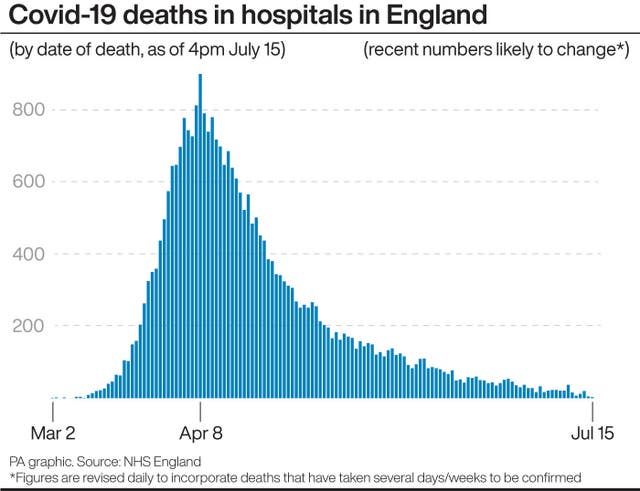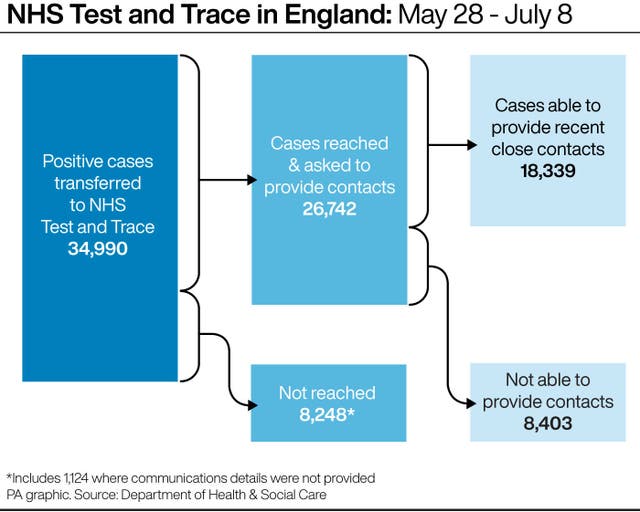Scientists pour cold water on PM’s ‘open by Christmas’ vow
A former chief scientific adviser, said that it could prove difficult with respiratory illnesses tending to flourish in the colder weather
A former chief scientific adviser, said that it could prove difficult with respiratory illnesses tending to flourish in the colder weather

Prime Minister Boris Johnson, wearing a face mask, talks with a paramedic during a visit to the headquarters of the London Ambulance Service NHS Trust.
Boris Johnson may struggle to deliver his vision of a “significant return to normality” in time for Christmas, leading scientists have warned.
The Prime Minister signalled another significant easing of coronavirus lockdown restrictions in England on Friday, relaxing work-from-home guidance and paving the way for theatres and sports stadiums to reopen.
At a No 10 press conference, he said it was his “strong and sincere hope” that ministers would be able to review the remaining restrictions from November onwards “possibly in time for Christmas”.
However scientists quickly poured cold water on the Prime Minister’s statement.
Sir Mark Walport, a former chief scientific adviser, said that it could prove difficult to achieve such significant relaxation with respiratory illnesses tending to flourish in the colder weather.
He said that while the disease was declining, there were still between 3,000 and 11,000 new cases a day in England.
“It is going to be difficult. We know that winter is when respiratory viruses thrive so it is going to be tough,” he told BBC2’s Newsnight.
“The Prime Minister said ‘Hope for the best, plan for the worst’. Of course what we need to do as far as possible is prevent the worst.”
‘Very complex time’
His comments echoed the chief medical officer for England Professor Chris Whitty who warned measures such as hand-washing, isolation and household quarantine would be needed for a “prolonged period”.
Giving evidence to the Lords Science and Technology Committee on Friday, he said: “It has not gone away. So, all of those need to continue for a long period of time.”
The Government’s chief scientific adviser Sir Patrick Vallance – who had previously warned against easing the work-from-home guidance – told the committee that the winter would be a “very complex time” with people going down with other illnesses which were not Covid-19.
In his address, the Prime Minister said it will be up to employers in England to discuss with workers whether it is safe to return from August 1.
From that date, also most remaining leisure centres will reopen and indoor performances with live audiences can resume if pilots are successful, while trials will begin for sports stadiums to reopen from October.
Mr Johnson – who also immediately scrapped the advice to avoid public transport – said Sir Patrick and Prof Whitty had taken part in a Cabinet discussion before the relaxation was announced
However he said that ultimately “decisions are taken by the elected politicians”.
It means that from next month, wedding receptions for up to 30 people can resume, and bowling lanes, skating rinks, casinos and beauticians can reopen as long as they have measures in place to reduce Covid-19 transmission.
Pilots to reopen sports stadiums will include the World Snooker Championship in Sheffield from July 31 and the Glorious Goodwood horse racing festival from August 1.
New local powers
In an attempt to prevent another nationwide shutdown, Mr Johnson said local authorities in England will have new powers from Saturday to close specific premises, shut outdoor spaces and cancel events.
Ministers will also be able to close entire sectors or types of premises in an area and issue “stay at home” orders, Mr Johnson said.
He also set out his plans to prepare the NHS for a potential second spike in Covid-19 cases coinciding with the flu season this winter, saying the nation must be “hoping for the best, but planning for the worst”.
An extra £3 billion funding for the NHS in England, and extra cash for the devolved nations, will allow Nightingale hospitals to remain open and for private hospital capacity to be used until the end of March.
UK coronavirus outcome has not been good, chief scientific adviser says
Sir Patrick Vallance told the Science and Technology Committee Covid-19 is likely to be around for a number of years.

Steve Parsons/PA Wire
The coronavirus outcome in the UK “has not been good”, the Government’s chief scientific adviser has told MPs.
Sir Patrick Vallance said there will be many factors that determine how well a country responds to the Covid-19 outbreak.
He also told the Science and Technology Committee that the virus is likely to be around for a number of years.
When asked about the UK’s response to the pandemic, Sir Patrick said: “As (chief medical officer Professor) Chris Whitty has said before, it’s very difficult to know where we stand at the moment.
“It’s clear that the outcome has not been good in the UK, I think you can be absolutely clear about that.
“It is clear you can see a band of countries that have done less well in the temperate zone.
Many factors
“Countries that are very well connected internationally, countries that have got population structures of a certain type
“There are many factors that are going to play in this as we look and say, ‘what is it that makes some countries having done worse than others?’, and there will be decisions made that will turn out not to have been the right decisions at the time.”
Sir Patrick had previously said 20,000 deaths would be a “good result” in the pandemic, but the latest figures show the UK has seen the deaths rise to more than double that.
He said that one lesson to learn from the pandemic was the “importance” of data flows.
He added: “It would have been absolutely preferable to have much greater testing capacity early on.
“But it’s not just testing, it’s basic information flows around patients in hospitals, around rates of admission, around rates of movement. Those sorts of things are important parts of this as well.”

(PA Graphics)
The committee also heard that what most people refer to when they discuss a second wave of the virus, is actually a re-emergence of the first wave which has been suppressed.
Sir Patrick said that if there is an increase in cases in the winter: “You could argue that is the tail end of the first wave still.
“And I think it is quite probable that we will see this virus coming back in different waves over a number of years.”
Lockdown
He also told MPs about the risks of lockdown, and that it was “crucially important” that the indirect impact of the lockdown on people’s health was fully understood.
The committee also heard that what most people refer to when they discuss a second wave of the virus, is actually a re-emergence of the first wave which has been suppressed.
Sir Patrick said that if there is an increase in cases in the winter: “You could argue that is the tail end of the first wave still.
“And I think it is quite probable that we will see this virus coming back in different waves over a number of years.”
Lockdown
He also told MPs about the risks of lockdown, and that it was “crucially important” that the indirect impact of the lockdown on people’s health was fully understood.
 (PA Graphics)
(PA Graphics)He said: “I think the chief medical officer has been pretty clear about this, and that is the way this should be looked at… overall excess deaths.
“If you look at overall excess deaths then you’re looking at the integrated effect of the virus itself with all the other reasons people may have suffered as a result of this.
“We do need to understand the impact of that and it’s very clear that lockdown itself carries risks, and those risks are to both physical health and mental health.”
No comments:
Post a Comment